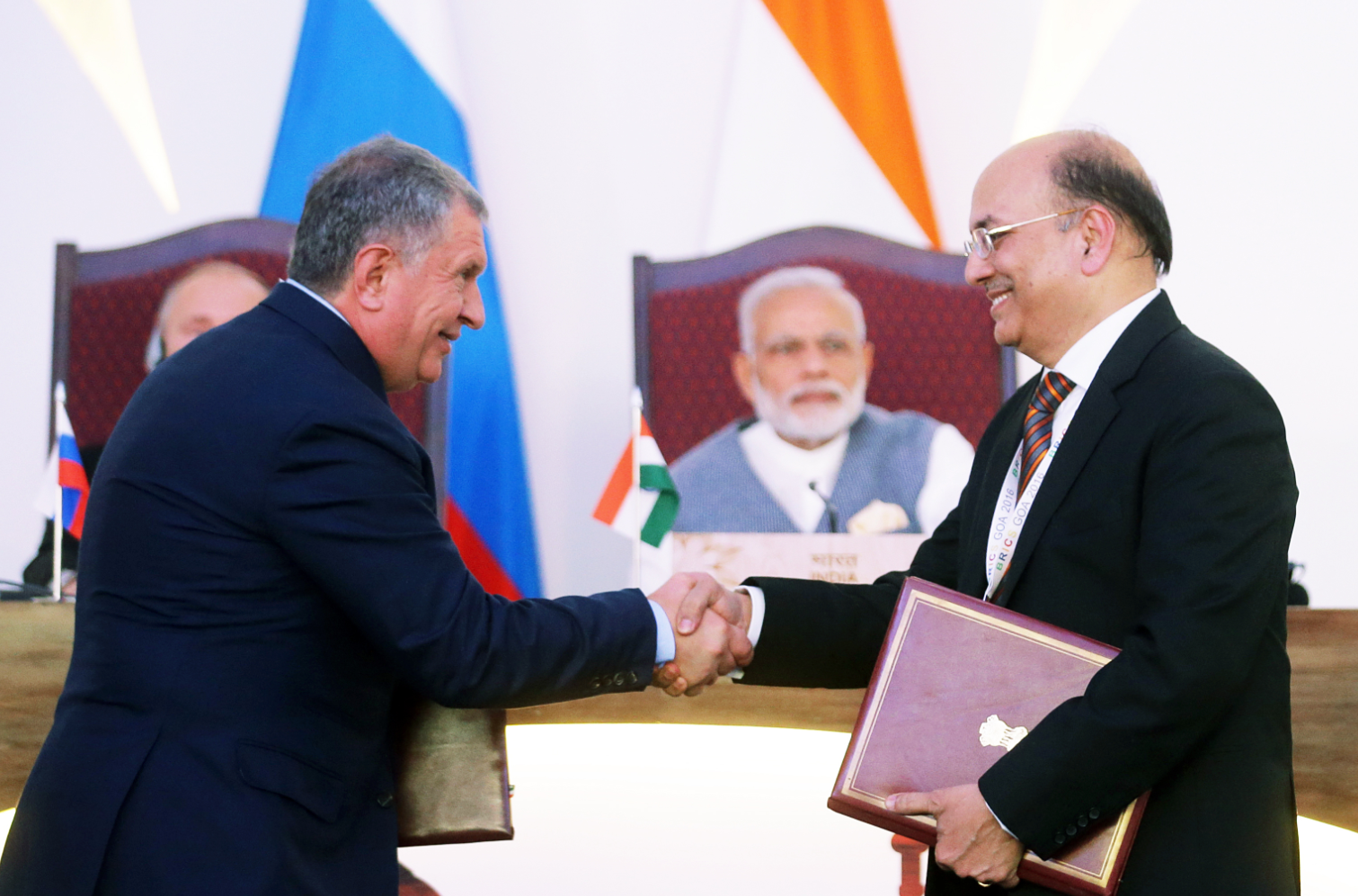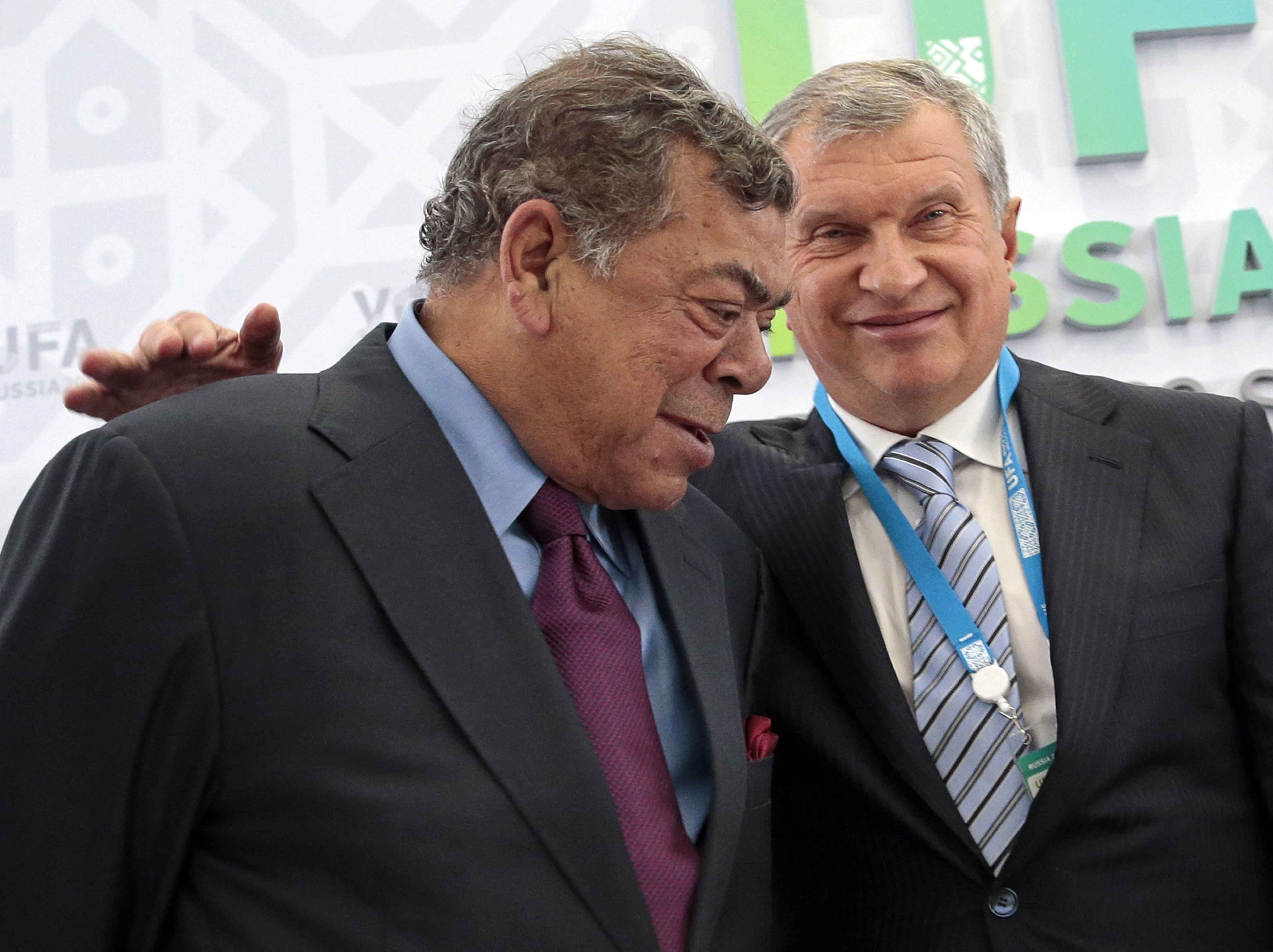Rosneft's Indian romance

Rosneft oil company CEO Igor Sechin, left, and Narendra Verma, Managing Director of ONGC Videsh Limited, at the ceremony of signing documents attended by Russian President Vladimir Putin and Indian Prime Minister Narendra Modi in Goa, India, Oct. 15, 2016.
RIA NovostiRussia’s energy ties with India, as amply demonstrated by Rosneft taking a 49 percent stake in India’s Essar Oil Limited, as well as recent Indian moves into the East Siberian upstream sector, are breaking new ground.
Both sides are set to benefit from such developments, as sanctions-stricken Russia avoids overdependence on China as its leading current energy partner and expands its geographical coverage of supplies. India, with a rapidly growing population and virtually no significant domestic oil reserves to make use of, acquires a stable and powerful partner in the largest national oil-producing company of the world. And this might be only the portent of things to come as both sides demonstrate interest in going the extra mile to take the relationship further.
The context of Russian-Indian energy ties
The foundations for the ongoing strengthening of energy ties were laid in 2001, when ONGC Videsh bought a 20 percent stake in the Sakhalin-1 offshore project, the largest Indian investment abroad at the time of its conclusion. The fact that this deal did not lead to further intermixing of interests and stakes is mostly due to the subsidy-laden character of the Indian oil sector up until 2015, as ONGC, for instance, annually spent roughly $6 billion on fuel subsidies, a fact that weighed heavily on the company’s finances.
The liberalization of the fuel market paved the way for Indian investments abroad. But even so, it was not without some fortuity that Russia and India drifted together – initially, Rosneft held talks with the Chinese national oil company CNPC on the sale of 10 percent of Vankorneft, yet the two sides were unable to settle the final price. Further down the line, ONGC Videsh turned out to be more generous in its approach, resulting in Rosneftselling it 15 percent of Vankorneft in a deal worth $1.3 billion.
After the initial Vankorneft sale in September 2015, the two sides agreed to the sale of an additional 11 percent of the Vankor oil field, thus raising ONGC’s stake to 26 percent. Concurrently, Rosneft sold 23.9 percent in October 2016 to an Indian consortium led by Oil India. All in all, Rosneft raised almost $5 billion without even relinquishing control over issues regarding the field's operation. The Vankor field already reached its peak production of 22 million tons per year in 2014 and will hover around the 20-21 million tons per year mark in the next few years.
Thus, ONGC’s output entitlement would reach 5.5 million tons per year, which, coupled with the Oil India-led consortium’s volumes would be almost equivalent to a third of India’s national oil production. In all this, despite the fact that India initially started out as a second-best alternative, it eventually evolved into a natural and low-risk business partner.
Rosneft’s new shopping spree in Asia
The longer the ongoing period of low oil prices remains, the quicker will be the pace of oil demand growth in India. This creates a unique opportunity for foreign companies to invest in India and consolidate their hold on the domestic refining market before the boom kicks in. It is in this context that Rosneft clinched the Essar Oil acquisition deal this month. By way of buying India’s second-largest Vadinar refinery, taking up almost 10 percent of its national refinery output, with a port at its disposal, Rosneft not only demonstrates that it is earnest about its ambition to gain a foothold in India, it is up for a scramble with India’s state-controlled companies.
Although technically Rosneft bought only 49 percent of Essar Oil, another 49 percent stake is equally divided between Trafigura, one of the leading commodity trading companies without previous refining experience, and United Capital Partners, a Moscow-based trust company whose head is a member of Rosneft’s Board of Directors. Trafigura’s role might be noteworthy, given the fact that the Vadinar refinery has been traditionally supplied by heavy, low-quality crudes from Venezuela and the Middle East.
Rosneft, having a stake in five Venezuelan PDVSA-led projects, is best suited to produce the required oil that is to be supplied by Trafigura. To this end, Rosneft signed a contract with Essar Oil in 2015 for the supply of 10 million tons, half of its current capacity, over a 10-year period. Such an arrangement would also allow Rosneft keep its Russian equity intact, and thus avoid jeopardizing its European and Asian contractual obligations.
On a different note, it is puzzling why Rosneft would go on a shopping spree against the background of its outstanding debt. Rosneft’s debt obligations for 2016 amount to $13.7 billion, as the company still struggles amid Western sanctions to repay the $55 billion it paid to acquire TNK-BP in 2013. What is more, Rosneft has only recently finalized itsacquisition of Bashneft, for which it paid $5.3 billion.
Much of its previous TNK-BP debt was acquitted via loans-for-supply agreement with Chinese companies, under which Rosneft received the required sum in return for future oil exports. With a part of its output collateralized and an impending necessity to settle its remaining arrears, such expansionism seems hazardous. Yet, given that India, a BRICS and Non-Aligned Movement member, is a long-standing strategic partner, there is every reason to believe that the Rosneft deal was concluded with vital governmental support.
Rosneft’s charm offensive is not restricted to the two leading Asian nations, India and China. Virtually simultaneously with negotiations regarding the Essar acquisition, the Russian major held talks with the state-owned Pertamina, Indonesia’s second-largest oil company. The two sides have agreed to construct a refining complex in the eastern part of Java within the framework of a joint venture, whereby Rosneft would get 45 percent. In return, Rosneft sold a 20 percent stake in its Northern Chayvo field off the Sakhalin coast and seems intent to have Pertamina acquire a 37.5 percent in its Russkoye heavy oil field in the Yamal-Nenets Region. Presumably, Rosneft will not content itself with its current standing and will further expand to other nations in the Southeast Asia region.
The article is abridged. Read the full version published by Russia Direct.
All rights reserved by Rossiyskaya Gazeta.
Subscribe
to our newsletter!
Get the week's best stories straight to your inbox

